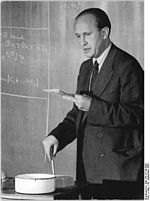Pál Turán
| Paul (Pál) Turán | |
|---|---|
 |
|
| Born |
18 August 1910 Budapest, Hungary |
| Died | 26 September 1976 (aged 66) Budapest, Hungary |
| Residence | Hungary |
| Nationality | Hungarian |
| Fields | Mathematics |
| Institutions | University of Budapest |
| Alma mater | University of Budapest |
| Doctoral advisor | Lipót Fejér |
| Doctoral students |
László Babai János Pintz |
| Known for | Power sum method Extremal graph theory |
| Notable awards |
Kossuth Prize Tibor Szele Prize |
Paul (Pál) Turán (Hungarian: [ˈpaːl ˈturaːn]; 18 August 1910 – 26 September 1976) was a Hungarian mathematician who worked primarily in number theory. He had a long collaboration with fellow Hungarian mathematician Paul Erdős, lasting 46 years and resulting in 28 joint papers.
Turán was born into a Jewish family in Budapest on 18 August 1910.At the same period of time, Turán and Erdős were famous answerers in the journal KöMaL. He received a teaching degree at the University of Budapest in 1933 and the Ph.D. degree under Lipót Fejér in 1935 at Eötvös Loránd University. As a Jew, he fell victim to numerus clausus, and could not get a university job for several years. He was sent to labour service at various times from 1940 to 1944. He is said to have been recognized and perhaps protected by a fascist guard, who, as a mathematics student, had admired Turán's work.
He became associate professor at the University of Budapest in 1945 and full professor in 1949. First he married Edit (Klein) Kóbor in 1939 and had a son Róbert then he married mathematician Vera Sós in 1952 and they had two children György and Tamás.
He died in Budapest on 26 September 1976 of leukemia.
Turán worked primarily in number theory, but also did much work in analysis and graph theory.
...
Wikipedia
